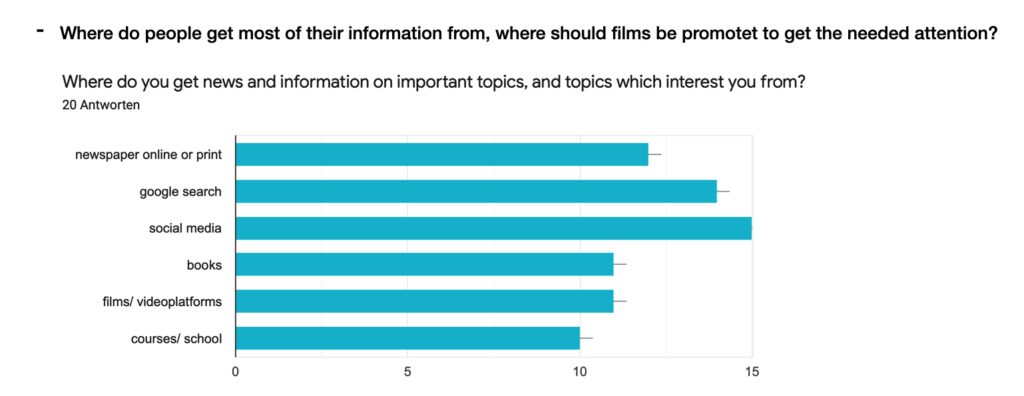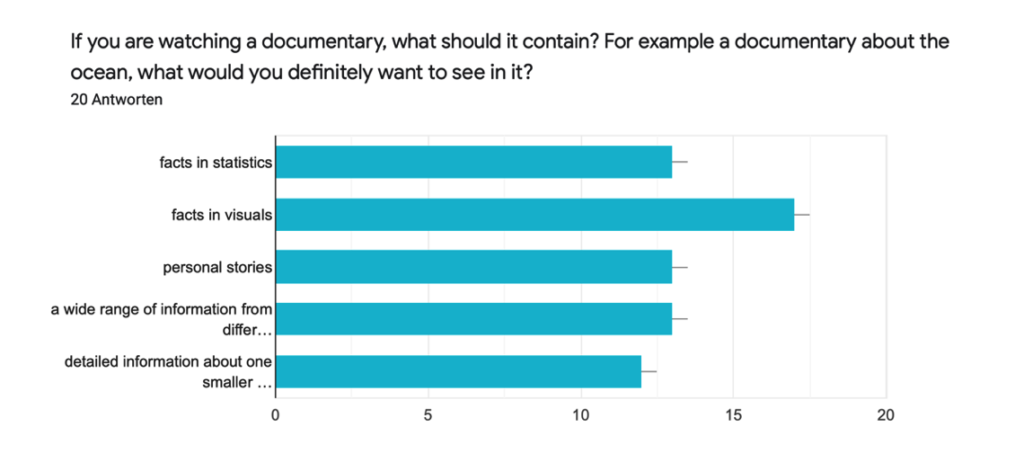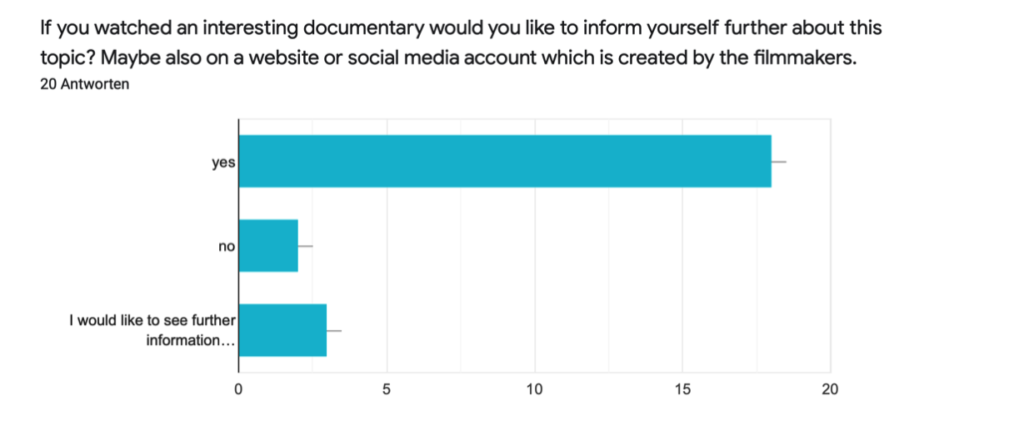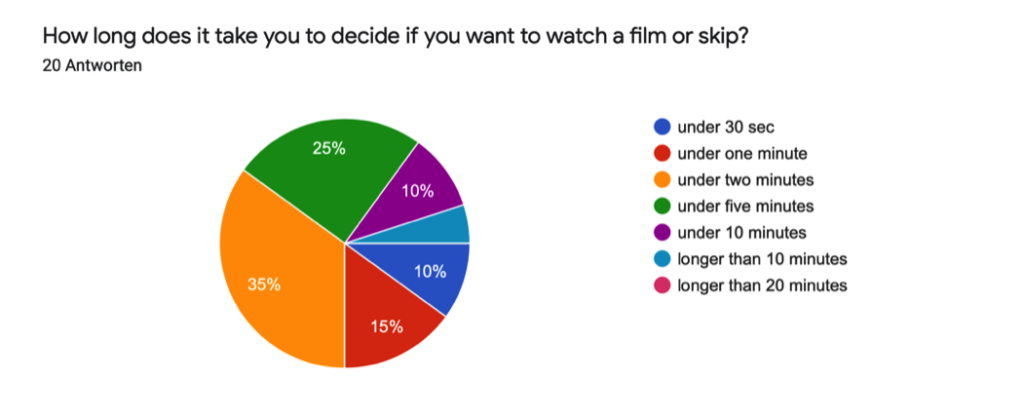Just like in the last weeks, an audience watched an environmental documentary and answered a couple of questions after they finished watching. In this weeks entry I am also going to summarize the results of all four films and show data I had gathered in another questionnaire.
The audience is upwards from 20 years, from different countries in Europe, with different backgrounds and genders. The same audience watched all four films which I introduced in the second entry.
Below are the results of the fourth weeks film.
The results shall help documentary filmmakers reach their audience better and get greater results in spreading their message.
How did the audience perceive Kiss the ground?
After the participators watched the film they filled out a questionnaire. I did go through the answered questionnaires and summarized the answers, the results are shown below.
All viewers stated that they were interested in the topic and almost everybody had already informed themselves about this topic.
What they liked about the film:
- That they show a simple way to help with climate change
- It’s a different and often unheard approach to combat climate change. It was quite optimistic
- The approached was good, the topic of climate change without solely focusing on renewable energy sources.
- A lot of views on the topic, a lot of facts
- It gave an actual sound solution
Everyone of the viewers thought that the topic was represented well.
65% of the viewers built a connection to somebody or something in the film.
Everybody stated that they want to research the film more.
What questions or thoughts came up?
- Why do the states support such big farms?
- It has raised thoughts, how to implement the new found knowledge without a garden
- The most interesting point was the possibility of no till farming styles
- It was less doomsday on the coming future and there might actually be a chance
What was memorable?
- The revegetation of parched farmland
- The pesticides they used where also used in world war two in the gas chambers
- The scale of the entire mass industrialized farming styles. It is difficult to grasp the size and scale of agriculture.
- The satellite imagery of how landscapes are severely modified by fields and the process of farming. However on the contrary, the capability of nature to recover and rebound after such massive soil erosion, i.e. Loess Plateau, China.
- That cows and live stock cab actually help with regeneration and not build a part of the problem.
What message did they take from the film?
- plant a lot of trees
- Soil science is deeply a deeply overlooked part of the carbon cycle, which we as a species rely on still most people do not understand it.
- Things can change for the better
- Every field can be saved
Do you think about where your food comes from and how it is made when you buy it?
Everybody answered this questions with yes
If you are not already checking where your food comes from, will you now?
Everybody answered this questions with yes
Conclusion of the answers of the four films and second questionnaire:
The information I gathered from the question results showed, what the people still remember after watching the film, what they liked and disliked about them. All four films were about environmental issues. Still they were all different and also perceived differently.
The main protagonist of the first film Mission Blue was scientist Silvia Earle, the second weeks protagonist of an inconvenient sequel was politician Al Gore. The questionnaire revealed that the audience had a lot more trust in a scientist than in a politician. Scientific facts were overall wished in every film and a variety of scientific facts made the viewer trust the message more.
A call to action and examples for resolutions are important, especially for films like this wich are about an environmental issue. Since the films are supposed to not only tell people about the problems but also make them a part of a positive change.
Shocking pictures seemed to stay in mind the best. „A new study suggests that we recall bad memories more easily and in greater detail than good ones for perhaps evolutionary reasons.
Researchers say negative emotions like fear and sadness trigger increased activity in a part of the brain linked to memories. These emotionally charged memories are preserved in greater detail than happy or more neutral memories, but they may also be subject to distortion.“
“These benefits make sense within an evolutionary framework,” writes researcher Elizabeth Kensinger of Boston College in a review of research on the topic in Current Directions in Psychological Science. “It is logical that attention would be focused on potentially threatening information.”
source-https://www.webmd.com/brain/news/20070829/bad-memories-easier-to-remember
With each film I asked if the viewers did built an emotional connection. „An investigation of autobiographical memories found that positive memories contained more sensorial and contextual details than neutral or negative memories (which didn’t significantly differ from each other in this regard). This was true regardless of individual’s personal coping styles.
- Emotionally charged events are remembered better
- Pleasant emotions are usually remembered better than unpleasant ones
- Positive memories contain more contextual details (which in turn, helps memory)
- Strong emotion can impair memory for less emotional events and information experienced at the same time –https://www.memory-key.com/memory/emotion
In fact did the results of the questionnaire show that people remembered shocking moments best and moments where they felt positive emotions and a connection to someone or something in the film.
The second questionnaire was answered by people in northern, central and south America, Australia, Asia and Europe, ages 20-65.
- Where do people get most of their information from, where should films be promotet to get the needed attention?

- Why do people like to watch documentaries?
To gain information about topics and learn something new.
- Have they watched a documentary which inspired them? Did it lead to an action?
From the answers I gathered from this question it turns out that documentaries can really inspire people to change something in their lives.
Some became activists because of documentaries they watched, others changed their lifestyle after watching a documentary and some were even inspired to choose their University major because of documentaries they watched on a specific topic before.
- What do people like to see in a documentary?

- Would they like further information about a topic they just watched?

- How long do they watch before they skip? How important is the beginning of a film?
The older generations 50+ stated that they need longer than two minutes, mostly 5-10min.
The younger generations, form early 20s to early 30s all stated that it takes them no longer than five minutes to decide if they want to watch a film, most of them not longer than two minutes.

- Under which criteria is a film selected? What needs to be especially good to bring people to watch a film?
